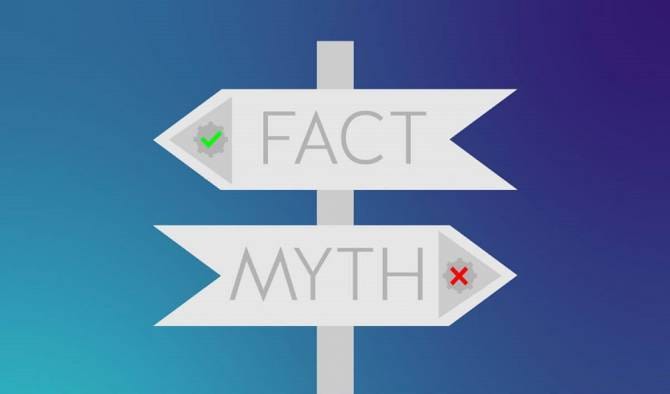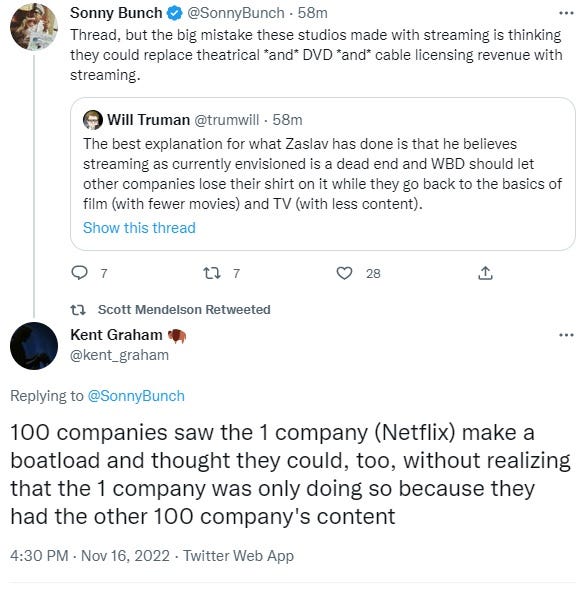Too Much TV: Your TV Talking Points For Wednesday, November 16th, 2022
Two different visions for the streaming video business.
Here's everything you need to know about the world of television for Wednesday, November 16th, 2022.
A QUICK PROGRAMMING NOTE
All of my Monday-Friday free newsletters remain free to all. I think keeping the newsletter free makes it much easier for readers to share it and based on the numbers I've seen, that happens a great deal. And while it's a bit contrarian to keep the newsletter free in an era where just about every newsletter has moved most of their content behind a paywall - or partnered with a newsletter network - I think the positives continue to outweigh the financial hit.
But I do receive a regular requests from people who want to support my work in some way. So here are a few options:
1) Share the newsletter and encourage others to do the same.
2) Buy me a cup of coffee (which is really just a way to throw a few dollars to me in a one time payment)
3) Subscribe to the paid version of the Too Much TV newsletter. I've priced it as low as I can on the Substack platform - $5 per month or $50 for the year. I'm working on some bonus stuff for subscribers, but honestly, this is mostly just an option for people who want to support the newsletter (and can afford to do so).
I completely understand the financial limitations we all work under. I certainly can't begin to pay for all the subscriptions on my list of "must read" publications. But if you're able to subscribe, I appreciate the support. I certainly think that I'm providing a unique point of view that you don't see in other publications.
And on that note....
TWO WAYS TO LOOK AT THE STREAMING VIDEO INDUSTRY
There are a couple of arguments I seem to have on a frequent basis when I talk with other TV critics, media industry journalists and casual fans of television. The arguments are so well-ingrained into the psyche of the industry that the phrase "conventional wisdom" doesn't begin to cover it. These are points of view that are embedded in the industry at a molecular level. The stories that everyone "knows" are true.
Except, when they're not.
I was reminded of this earlier today, when I read this string of tweets, which made the argument I hear all of the time from people. "Oh, streaming is never going to be as profitable as the traditional linear TV business. But big media companies blew up that business in order to foolishly chase Netflix":
Critics of the streaming business are correct when they say it's a lower margin business. But that doesn't make make it a bad idea.
Executives who grew up in the golden days of linear television long for those 40 percent margins (and larger) that were made possible by market consolidation, few choices for subscribers, and a carefully crafted assembly line of markets that allowed new TV shows to move from broadcast & cable first-run to physical product, on-demand and then through various levels of syndication. Every stop along the way provided another taste of revenue as well as plenty of residuals.
Streaming is a very different business, but it's worth noting that it's not inherently unprofitable. I was amused to hear a Warner Bros Discovery financial exec recently shrug off the company's streaming business by noting that it's only a "20 percent margin business." For those of you who aren't CFO's or financial reporters, it's worth mentioning that in nearly any other industry, a 20 percent margin is considered to be the sign of an extremely profitable business.
It's also worth noting that it took the linear TV business decades to become the money-printing machine it was circa 2000. Expecting streaming to somehow become wildly profitable without putting in the time and money to build the business is just nonsensical.
But a bigger problem is the argument that big media companies blew up their linear TV business in order to chase streaming is more memory wipe than fact. It might be easy to forget, but while streaming accelerated the shift, it wasn't the primary reason for the ongoing collapse of the traditional TV and movie business.
Even before Netflix became a powerhouse, linear TV was starting to see customers shifting away and looking for other options. It's not that different than the factors that led to the rise of Napster in the music industry. Thanks to the collapse of the singles market, most music fans had to pay top dollar for albums which often only included a few songs they were interested in owning. As soon as an option appeared - streaming or not - market forces ensured unhappy customers would bail on the very traditional music industry business model.
And it was the same in the television industry. Cable TV customers were paying top dollar for a collection of channels that few people wanted. You couldn't subscribe to channels ala carte and whatever cable company you were unlucky enough to be stuck with used their near-monopoly status to nickel-and-die their customers with increasingly nutty surcharges. So it's not surprising that unhappy customers began to bail as quickly as they could. Netflix wasn't the cause of this unhappiness. But they were a lifeboat for many TV and movie fans.
A lot of these arguments are especially relevant now because this is the core of the current approach being taken by executives at Warner Bros. Discovery. Streaming is just another platform, not a real stand-alone business. The future is still in the traditional revenue funnel of theatrical/linear TV. Big is better, but a scaled-down big is best. It's the kind of reactive holding on to a business model that is disappearing which leads executives to make ill-advised strategic moves as they scramble to hold on. It's the type of survival instinct that made music industry executives look at the disappearing market for vinyl 45 rpm singles and decide that putting two tracks on a cassette tape and calling it a "cassingle" was a good idea.
No business can long withstand the combination of unhappy customers, few alternatives and greedy companies who use their market leverage to extract more money from their customers. This shift was always going to happen eventually. Netflix and streaming might have been the specific catalyst. But it wasn't the cause.
And that is the core of the problem right now. Media executives and shareholders are accustomed to seeing margins that are unrealistically large in any but the most unusual times. So they blame the streaming business instead of recognizing that the gravy train days of printing money without worrying about competition from other forms of entertainment is coming to an end. Yes, maybe in a world without Netflix and YouTube and Twitch and TikTok it might be possible to keep the linear TV business thriving indefinitely. But that's not the Earth we live in.
WARNER BROS DISCOVERY TO SHUT DOWN GOLFTV OTT
One of the things that changed after the Warner Bros. Discovery merger closed was that the company quietly excluded certain groups of subscribers from its overall numbers for global direct-to-consumer subscribers. The company simply refuses to provide any guidance about why or how many subscribers aren't being publicly counted. But based on the groups that are being excluded, my guess these products are shedding massive numbers of subscribers and WBD executives don't won't those losses to impact their overall numbers.
The company made the shift at a time when HBO Max was quickly adding subscribers, so the change wouldn't severely impact the global subscriber growth numbers. And making the change early on after the merger protected the company from dealing with future bad news publicly as it shut down those services and tried to push them into whatever service HBO Max will be called in a few months.
Those excluded subscribers include domestic and international Cinemax subscribers, international basic HBO subscribers & people who subscribe to DTC products, other than discovery+, HBO and HBO Max. The latter group would include services such as Boomerang and GolfTV.
And like clockwork, Warner Bros. Discovery has announced it is shutting down its GolfTV OTT service, which it launched in 2019 as part of an overall rights deal with the PGA. GolfTV’s live coverage will be moved to Discovery+ or Eurosport’s digital platforms where the broader direct-to-consumer (DTC) service is available, with subscribers offered the opportunity to move over to those products. In other international markets where neither of those services are an option, GolfTV subscribers will be directed to local broadcast partners.
I predict you are going to see more of these moves, as WBD executives roll as much as they can into their main streaming service.
ODDS AND SODS
* PBS announced Wednesday that Geoff Bennett and Amna Nawaz will be the new co-anchors of PBS NewsHour.
* The animated series My Dad the Bounty Hunter premieres February 9th on Netflix.
* Fox News has decided to extend conservative talk host Mark Levin’s current multi-year deal, ensuring that he will remain host of Life, Liberty & Levin, which airs Sundays in primetime on Fox News.
WHAT'S NEW FOR WEDNESDAY:
Here's a quick rundown of all the new stuff premiering today on TV and streaming:
Call My Agent! (Korean Version) (Netflix)
In Her Hands (Netflix)
Hostel Daze (Prime Video)
Leverage: Redemption Season Premiere (Freevee)
Limitless With Chris Hemsworth Series Premiere (Disney+)
Martha Cooks Series Premiere (Roku Channel)
Martha Cooks Series Premiere (The Roku Channel)
Master Of Light (HBO)
Mind Your Manners Series Premiere (Netflix)
Murder In The Heartland Season Premiere (Investigation Discovery)
Murder Under Friday Night Lights Season Premiere (Investigation Discovery)
Off Track (Netflix)
Racionais MC's: From the Streets Of São Paulo (Netflix)
The Lost Lotteries (Netflix)
The Santa Clauses (Disney+)
The Wonder (Netflix)
Where Is Private Dulaney? (Hulu)
Click Here to see the list of all of the upcoming premiere dates for the next few months.
SEE YOU THURSDAY!
If you have any feedback, send it along to Rick@AllYourScreens.com and follow me on Twitter @aysrick.





